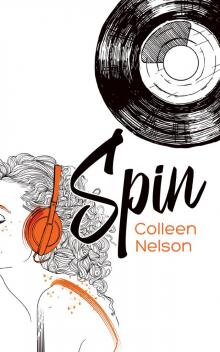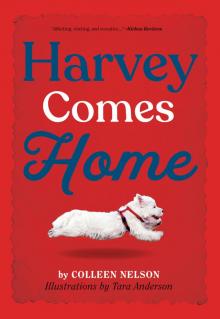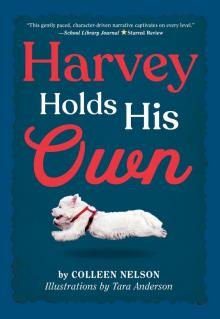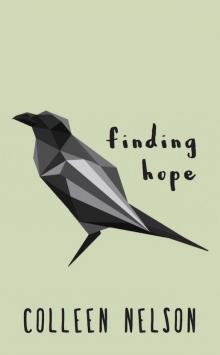- Home
- Colleen Nelson
Pulse Point Page 2
Pulse Point Read online
Page 2
She called up memories and projected them from the pulse point in her fingertip as holograms. Some of them I kept, second-hand, filing them away in my memory chip so I could watch them over and over. Raina had been a surgeon, curious and bright; excelling in academics, she’d gotten in trouble for her endless questions. The memories showed a tiny female with a laugh that burst from her mouth. Her movements were quick and efficient, not plodding like Sy’s.
I couldn’t replicate her laugh, but I’d tried. I thought bringing part of her back to life would ease Sy’s troubled mind. “It doesn’t work that way, Kaia,” Mae had said. “You’ll never be her.”
I wasn’t smart enough to be a surgeon, so I was sent to the clinic as a fetal assessment technician. It was here, with Sari, that I spent my days bent over a microscope testing embryos for genetic abnormalities. It wasn’t until I’d been working for a few months that I realized, after trying so hard to be like Raina, I’d been given a job that had more in common with Sy’s. I was a gardener too, tending the crop of future Citizens.
A lineup of females greeted me when I walked in. The clinic’s bleak interior, whitewashed adobe walls and floors, was devoid of personality. The constant hum of the pulse piece, spewing information in my ear, was the only sound in the space. I pressed a spot behind my ear and turned it down low; the sudden quiet was disarming. Like an extra limb, the noise of the pulse point was as familiar to me as breathing. But at work, it was also a distraction. I’d get caught up in the latest weather report and ignore a patient’s question. With it nearly silent, I could hear the gentle slap of my bare feet on the floor and the way females cleared their throats when we called their names, the little cough belying their nerves.
My stomach clenched when I saw my first patient of the day sitting in the waiting area. I recognized her. Older than me, she’d been in with another pregnancy a few months ago. Lying on the table, she’d told me the names that she’d chosen, her cheeks rosy with excitement. It had only taken a second in the screening room for me to tell that something was wrong with the embryo.
I’d told her as gently as possible, but she’d looked at me as if it were my fault the fetus was defective and it had to be terminated. And now, she was back again.
Her blood filled the vial, swirling in a gush of scarlet. Pale, her mouth pinched with worry, she’d stared at the ceiling until I pressed the vein and pulled out the syringe. I gave her a reassuring glance and left the room to run the first test.
The equipment had been in the City since before. State of the art for the Originals, it showed its age now. The metal was dented and nicked, small blips and static filled the screens. The room was off-limits for anyone but a technician. Did the patients wonder what went on back here, where we determined the viability of the offspring?
Placing a droplet of her blood on a glass slide, I pushed it under the scanner. A warning beep came back almost immediately. My stomach clenched. An aberration. I ran the test again. Same beep. I didn’t need to run further tests. It would have to be aborted.
“What’s wrong?” Sari whispered when she saw the look on my face.
“It’s not viable.”
Sari’s eyes slid away from my face. She took a deep breath and concentrated on her lab work.
“It’ll be her second termination,” I told her, frowning. For a moment, I thought about not telling her. What if the baby was born and the abnormalities weren’t evident at first? Or maybe never? What if whatever genetic mutation showed up on the test wasn’t an issue? Maybe the baby would just have a birthmark like Lev had, or be left-handed. I never knew exactly what was wrong, just that something about the DNA didn’t fit within the parameters set out by the Council when the City began.
“You have to tell her,” Sari said, reading my hesitation correctly.
I nodded. The City demanded every Citizen contribute. We couldn’t be responsible for anyone who was unable to produce energy. The only way for the City to remain efficient was to follow the rules. A fetus showing genetic anomalies must be aborted.
The patient, her skin ashen, sat on the table. I’d been gone longer than normal. She twisted her tunic between her fingers, squeezing her eyes shut and muttering pleas for her unborn child.
The words spilled out of my mouth before I could think about the implications. “Everything looks normal,” I said with a forced smile. She gave a sigh of relief, her face lighting up with a grin, oblivious to my wide-eyed amazement at what I had just done.
Swallowing back bile that rose in my throat, I nodded that she could leave. She would be told eventually, probably next month at her appointment. I’d only delayed the inevitable. She’d enjoy four weeks of thinking a healthy offspring grew inside of her. And then? I turned away and went to call the next female.
⌓
Since I’d been at the clinic, the storm clouds had opened up. Rain hammered on the exterior walls of the dome, blurring the landscape outside. The stream that ran through the City was already churning with the newly collected water. Sy would be happy. His garden, at the far end of the City, would be well-irrigated.
But seeing the rise in water level, I moved away from the edge of the walkway. Mae had told me that before, people would play in water. Swimming, she called it. I didn’t understand how it was enjoyable, to splash the way she explained. My experience with water was short bursts of hot steam in the communal cleaning cubicles. The droplets condensed on my skin and then I wiped them away. There were many things from before that made no sense to me, some of them were funny, but others had been destructive. I was glad I was in a place where those mistakes wouldn’t be made again.
Which is why my lie to the female at the clinic that morning was so dangerous. Mae told me defectives used to be born and then cared for. I knew the City couldn’t run like that: it wasn’t sustainable to care for people who couldn’t provide for themselves. So, why had I lied to the female? If an overseer found out what I’d done, I’d be punished and sent to an underland cell. I’d been placed in the clinic because of my personality profile. “A unique ability to show compassion and logic with others” it had read. I hadn’t shown either today.
125, the joules I’d earned that morning in the gymnasium, glowed through my skin. I stared at the number. Even after a day of using the City’s energy at my workspace? I rubbed my thumb against my finger feeling the raised bump under my skin. Its incessant beat had vanished. How had I not noticed it before?
I paused on the walkway and held up my finger. The small gesture produced a hologram that floated in the air in front of me. I sighed with relief. Maybe I’d imagined the stillness. All the usual information appeared: a weather report; Council bulletins; my energy calculations for the day; and Sy, Lev, Sari and Mae’s locations within the City. An icon on the bottom opened the images saved in my memory chip and the current Prim threat level, low, as usual.
I looked at the hologram more closely. Some of the information was wrong. Clear skies, it read. Calm winds. But outside, the storm raged with no sign of letting up. “Weird,” I muttered under my breath. I stared at it a moment longer, then tucked my finger into my palm when two overseers appeared.
Crossing a bridge, I looked towards the Mountain, where the stream entered the City. The water was purified by an ultra-violet light system, and the City relied on a constant supply flowing in and out. I followed the stream towards the terraced dwellings that were made of adobe, like every other structure in the City. The clay was easily repaired and required little energy to produce; it stayed cool, moderating the City’s temperature. Each unit had a balcony as big as the dwelling itself filled with rows of hydroponic plants. None was as crowded as ours though. Sy’s talents as a gardener ensured that we ate well.
From the walkway, I could see Sy’s tall, lean figure hunched over one of the plants. Which Sy would greet me? I wondered. His moods were unpredictable, switching from near manic to apathetic. Some days,
he’d sit comatose, refusing food, rousing himself only to go the garden. His energy level had gone dangerously low a few times and I’d had to energy share so he didn’t draw the attention of an overseer. I raised my hand in a hesitant wave when he looked down to the walkway. He grinned and held up a bright red tomato, its skin glistening. I breathed out another sigh of relief. For today at least, I had nothing to worry about.
The musky, earthy odour hit me as soon as I walked in, so different from the antiseptic smell of the clinic. In my dwelling, vines snaked around the room and beans dangled from the ceiling. Clusters of tomatoes glistened in hydroponic containers and rows of lettuce bordered the room. Sy grew things in our dwelling that he wasn’t allowed to grow in the garden, like strawberries and lemons. Over the years, these plants had been deemed too inefficient, the nutrients they provided to the Citizens not worth the resources they consumed. But Sy had saved the seeds and if he wanted to deplete his joules caring for them, so be it. I wasn’t complaining. There was no taste better than a fresh strawberry.
The bright colours jumped out against the adobe walls and bamboo furniture. Like other Citizens, we had only what we needed in our dwelling: a bamboo bench, one low table in the dining area and another, taller table for preparing food. A few pillows sat on the floor for lounging in the sitting area. Our sleeping capsules were down a narrow hall.
Mae stood at the tall table organizing a basket of food she would bring to the communal kitchen. “Sy brought beets home,” she said and held them up by the stems, like a prize. “I thought we could make soup.”
Mae was a head shorter than me, her short hair shone silvery, and her eyes were still lively and crackling with energy. Wrinkles nestled into her papery soft skin. As she filled a basket with supplies, I stared at her hands, mesmerized by the gnarled, purplish veins and bulging knuckles. There were few Citizens as old as Mae left in the City.
“I’ll help,” I offered. We piled the beets, along with onions and garlic into the basket and she picked it up. She’d only gone a step or two before she gasped. Her forehead furrowed with pain. “My hip. It hurt too much to exercise today.”
“Did you tell Sy?” I asked.
“There’s no point in keeping it a secret.”
Her pragmatism made my heart lurch. Why couldn’t I have been as practical at the clinic today?
Pulling up my hologram, I swiped my finger to a picture of Mae, frowning when the locator said she was in the market. With another swipe, I shared 50 joules with her and glanced at my finger. It still read 125. “How many joules do you have?” I asked.
“Oh!” she gave a surprised gasp. “Can you spare that much?”
I nodded, ignoring a twinge of guilt. I shouldn’t be sharing energy when my pulse point was broken. But Mae needed the joules, I reasoned, and it wasn’t like I’d stolen them.
The added energy bolstered Mae, and even though she limped a little, she collected the final supplies for the kitchen with more vigour. “I’ll tell Sy we’re going,” I said.
He was still on the balcony tending to the plants but looked up when I joined him. Plucking a grape off the cluster, he rolled it between his fingers. “Try this.” He held it out to me. Soil rimmed his fingernails, outlining the oval shape. Long and tapered, they belied the strength hidden beneath the calloused fingers.
Resting the basket against my hip, I took the grape, admiring the plumpness of it and popped it in my mouth. The juice burst on my tongue, sweet against the bitter skin. “It’s good,” I said, swallowing.
“A drought-resistant strand. I think I’ve got it perfected.” He put another one into his mouth, savouring the taste.
From the walkway below, someone called my name. When I looked over the ledge, Sari waved up at me, a basket of supplies in her arms.
“Are you coming?” she called, as if I should have been expecting her.
“To the kitchen?”
“I sent you a message,” she said. “After work.”
She had? I felt a flicker of worry. I’d never received a message from Sari. Although, she was flighty. Maybe she thought she’d sent it and hadn’t? I pressed my thumb to my finger, urging my pulse point to start beating, but there was nothing. The little chip inside of me was dead. “Be right there. Mae’s coming too.”
The storm clouds had turned the sky dark. A subtle glow emanated from the solar lights lining the walkway. Mushroom-shaped umbrellas that captured sunlight during the day, they collapsed into lampposts in the evening. Located between the dwellings and the garden with the field and wastewater pond beyond, the kitchen was a low-walled structure filled with separate workstations for Citizens to use. Each one had a counter, stove and oven, powered by piped-in gas. Along one wall was a trough sink and on the other, compost and vermiculture bins. As usual, it hummed with activity. Mae went to a long table and set out our supplies, while Sari and I found empty cooking stations.
I hesitated before touching my finger to the sensor, worried that it wouldn’t start. But gas hissed through the element, ready to be lit. Beside me, Sari was about to do the same, but I waved her hand away. “Let me.” Once again, igniting both elements hadn’t depleted my joules.
“Thanks,” she whispered, tucking an errant strand of hair behind her ear.
“So you sent me a message an hour ago?” I asked.
“Yeah, two actually, when I didn’t hear back.” She leaned in closer. “Did everything go okay, with the termination?”
I nodded. The kitchen wasn’t the place to tell Sari what had really happened. And I wasn’t sure I could. I’d broken every rule we had at the clinic.
“I didn’t get either of them,” I said, frowning. “Have you ever heard of a pulse point malfunctioning?”
Sari put a pot of water on the element and shook her head.
I gave an irritated sigh. “Mine’s stuck on yesterday’s weather. It’s not getting the newsfeed, or messages. And”—I checked to make sure no one was listening—“I don’t think it’s spending my energy.”
“Did you tell an overseer?”
I shook my head.
Sari widened her eyes in surprise. “You haven’t told anyone?”
“I only noticed after work,” I said with a guilty look. Mae’s laugh trilled out from where she worked, her shoulders shaking as she talked with a male elder.
“So, you mean, you could use as much energy as you want and it wouldn’t affect your supply?”
I showed her my finger. “The same number as after I ran this morning, nothing’s been depleted. I even gave Mae fifty joules.”
She raised her eyebrows in disbelief.
I lifted my finger and the hologram appeared. With a few swipes, I shared another fifty joules with her. A second later, the digits on her finger blinked and a new number glowed through her skin, but mine stayed the same.
She gasped and started to giggle. “Kaia!” she exclaimed joyfully, but then quickly became serious. “What if an overseer finds out?”
“Maybe it’s just a glitch. It might fix itself.”
“I wouldn’t blame you if you didn’t want it to be fixed. Can you imagine not having to worry about depleting your energy? Not having to run for hours every day?” Even though her words were said in a whisper, I gave her a look of caution as Mae came over, the beets glistening on the cutting board, free of their gritty peels.
“What are you two gossiping about?” Mae teased, dumping the beets into the water to boil.
“Matching,” Sari blurted. She threw me a look. “As usual.”
“I remember those days,” Mae gave her a wistful smile. “Your pot, Sari.” It had boiled over and with a gasp of surprise Sari ran to her station. Mae shook her head with a grin. When she turned back to me, her expression grew serious. “So, you’ll talk to Sari about matching, but not me?”
Her question stung because we hadn’t been talking about
matching. “You have nothing to worry about,” Mae said, forcing me to look at her.
“Yeah, right,” I grumbled. Mae had told me about before, when people chose their mates based on love, not genetics. It was such a risk, to let emotion dictate a choice like that. The City had taken away that choice in the first years Citizens lived here.
She clucked her tongue at me. “DNA isn’t the only factor in a match, Kaia.”
But it was the biggest. And thanks to Raina’s early death, potential mates would worry that whatever had killed her would affect me, or could be handed down to offspring. And then there was Sy. We kept his shaky mental state a secret from the overseers, but I couldn’t hide it from a mate. What if it got passed on to offspring? Or developed in me as I got older?
“I have genetic anomalies on both sides,” I whispered. “Who would want me?”
The truth was, it wasn’t just the probability of a poor match that bothered me. It was Lev. The thought of losing him to someone else sent pains shooting through my chest.
“The beets are ready,” I said, and pulled my hands away, relieved to change the subject. I lifted them, steaming and slick, out of the boiling water. The knife sliced the beets smoothly; their blood-red juice stained the cutting board.
“Don’t look so glum, Kaia,” Mae said. “You’re young. You have so much to look forward to.”
I bit back a retort. One day, and I didn’t know when, she’d be balanced. My friends would be matched and I would live in a communal house with no mate and no offspring. As far as I could tell, I had nothing to look forward to.
I looked at my finger. 125.
Maybe Sari was right, why draw attention to my pulse point if I didn’t have to? I hadn’t done anything to break it. Let the overseers figure it out. Until then, I should enjoy my newfound freedom as long as I had it.

 Spin
Spin Harvey Comes Home
Harvey Comes Home Harvey Holds His Own
Harvey Holds His Own Pulse Point
Pulse Point Finding Hope
Finding Hope Sadia
Sadia Blood Brothers
Blood Brothers